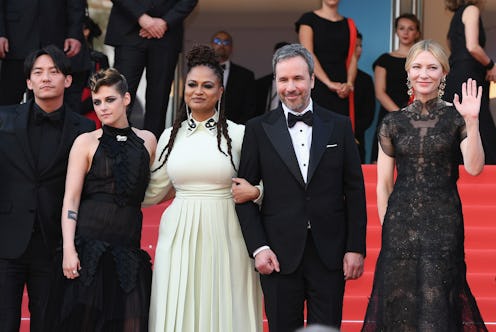Entertainment
Cate Blanchett Led The Cannes Women's March & Her Powerful Statement Will Make You Cheer

At the 2018 Cannes Film Festival, 21 directors are competing for the top prize: The Palme d'Or. Three of those directors are women. Just three. As a result, a Cate Blanchett led the Cannes Women's March to protest the lack of womendirectors in the industry and the film festival on Saturday, May 12. She was joined by Kristen Stewart, Ava DuVernay, and dozens more stars at the festival. The protest was meant to shed light on inequality in the industry. (Bustle reached out to Cannes for comment, but has not yet heard back.)
For its part, the Cannes Film Festival is planning to sign a commitment to diversity on Monday, May 14, according to Deadline. The festival told Deadline in a statement on May 11:
“The Festival de Cannes is partnering with a united positive action, initiated by the 50/50 By 2020 collective and Time’s Up. A symbolic image will be created on Saturday, May 12, before the signing of concrete, strong commitments on Monday, with diversity and parity guidelines.”
According to a ScreenDaily study cited by IndieWire, in the last 71 years of Cannes, 82 films have been directed by women, yet in contrast, over 1,500 entries were directed by men. As a result, Stewart, DuVernay, Blanchett, director Agnés Varda, and fellow industry leaders — 82 in all — will gather for a silent red carpet walk to represent those films. Together, they stopped to face the iconic Palais des Festival. The group hoped to demonstrate "how hard it is for women to climb the professional ladder in the cinema world,” according to IndieWire.
During the march, Cate Blanchett read the following statement, according to The Hollywood Reporter:
These facts are stark and undeniable. Women are not a minority in the world, yet the current state of our industry says otherwise. As women, we all face our own unique challenges, but we stand together on these stairs today as a symbol of our determination and commitment to progress. We are writers, producers, directors, actresses, cinematographers, talent agents, editors, distributors, sales agents and all involved in the cinematic arts. We stand in solidarity with women of all industries,
Stewart and DuVernay are members of this year's Cannes Competition Jury, and Blanchett currently serves as president. That powerful, diverse women — and particularly ones in positions of power at this year's festival — are willing to help lead this protest proves how serious they are.
Blanchett went on to say the following in her statement, according to THR:
We will expect our institutions to actively provide parity and transparency in their executive bodies and safe environments in which to work. We will expect our governments to make sure that the laws of equal pay for equal work are upheld. We will demand that our workplaces are diverse and equitable so that they can best reflect the world in which we actually live. A world that allows all of us behind and in front of the camera to thrive shoulder to shoulder with our male colleagues. We acknowledge all of the women and men who are standing for change. The stairs of our industry must be accessible to all. Let’s climb.
She also mentioned in her statement that in the 71-year history of the festival, only two women ever were awarded the Palme d'Or.
The protest has been organized by 5050x2020, which IndieWire describes as a French cinema gender equality movement. The official website has dozens of signatories from all areas of the industry, and its official purpose is to enhance the industry presence — and the paychecks — of people who are not men. According to Variety, the march was expected to "symbolically draw attention the difficulties that women face climbing the social and professional ladder in the male-dominated movie business," but Blanchett's statement pushed it further than that.
A USC Annenberg study from 2016 revealed what it feels like the rest of the us already knew — that the director's chair is overwhelmingly male and white. The school did a deep dive into all levels of the industry, and the results point to a staggering gap between white men and literally everyone else at every level of the industry: the ratio of female to male directors is 24:1. The study also pointed out that in 2016, only 4.2% of 1,000 films were directed by women.
It would be eye-opening, if it didn't also feel so obvious. That's why having powerful women call attention to it at a place as legendary as the Cannes Film Festival is so important. No longer will people be able to overlook the lack of women in their projects.
The event is well-timed, too. Variety also notes that on Monday, May 14, a roundtable involving Time’s Up US, Time’s Up UK, Italy’s Dissenso Comune, Spain’s IMA, and the Greek Women’s Wave, as well as Cannes Film Festival’s chief Thierry Fremaux, Directors’ Fortnight’s Edouard Waintrop and Critics’ Week’s Charles Tesson.
All in all, It's beyond inspiring to see the waves of inclusive movements taking over the film industry. Hopefully, the Cannes red carpet protest will be yet another step toward true, lasting progress.